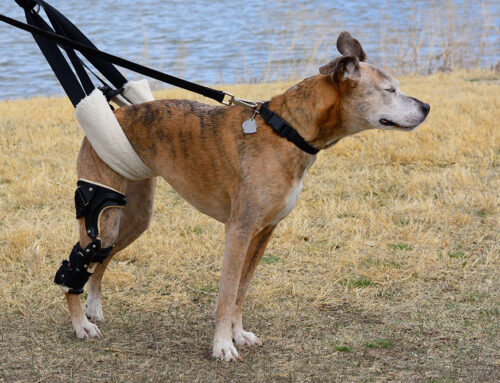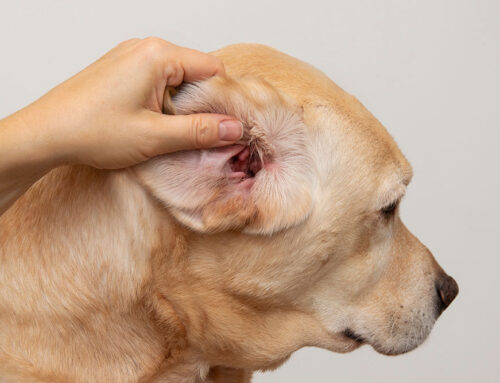As our dogs grow older, we begin to notice the subtle shifts—maybe they no longer leap onto the bed like they used to, or they need a little encouragement to finish a walk. These everyday changes can be easy to overlook, but they’re often the first clues that your dog is entering their senior years.
At Animal Medical Center of Marquette, we understand how bittersweet it can feel to watch your dog age. You’ve shared so many milestones together, and now your role includes helping them age with comfort, dignity, and quality of life. The good news is that with proactive veterinary care, awareness of age-related changes, and small lifestyle adjustments, you can help your senior dog enjoy many happy, healthy years by your side.
Osteoarthritis and Joint Pain in Senior Dogs
Understanding Osteoarthritis
One of the most common conditions we see in older dogs is osteoarthritis, a degenerative joint disease that affects mobility and comfort. Many pet parents chalk it up to “just getting older,” but arthritis pain is real and treatable.
You may notice your dog hesitating before jumping into the car, or limping after a nap. These are often the first signs of joint pain.
Common symptoms of arthritis include:
- Stiffness or limping, especially after rest
- Reluctance to jump, run, or climb stairs
- Difficulty rising from lying down
- Swollen joints or sensitivity when touched
Management Tips:
- Maintain a healthy weight to reduce joint stress
- Use joint-supportive supplements (glucosamine, chondroitin, omega-3s)
- Incorporate low-impact exercise like swimming or short leash walks
- Explore therapies like acupuncture, laser therapy, or physical rehab
Explore safe activities in the Mobility Matters Guide – AAHA and find helpful devices at Canine Arthritis – Assistive Devices.
Cognitive Dysfunction Syndrome (CDS) in Dogs
Recognizing Cognitive Changes
If your dog starts pacing at night, staring at walls, or forgetting routines, they may be experiencing cognitive dysfunction—similar to dementia in humans. It’s a heartbreaking shift, but early intervention can slow progression.
Signs of CDS:
- Disorientation or confusion in familiar places
- Disrupted sleep-wake cycles
- House soiling despite prior training
- Increased vocalization or anxiety
Care Strategies:
- Stick to a consistent daily routine
- Provide enrichment with puzzle toys and new routes during walks
- Consider diets rich in antioxidants, DHA, and B vitamins
- Speak with your vet about medications like selegiline
For more details, see Cognitive Dysfunction – Cornell Canine Health Center and Colorado State: Signs of Cognitive Decline.
Hypothyroidism in Senior Dogs
What to Watch For
This condition slows your dog’s metabolism and can lead to a range of symptoms. If your pup has become less active, is gaining weight unexpectedly, or has a thinning coat, it might be time to test thyroid levels.
Symptoms include:
- Weight gain without increased appetite
- Lethargy or decreased endurance
- Dry skin or hair loss
- Increased cold sensitivity
Treatment involves daily hormone replacement and regular monitoring. With the right dose, most dogs bounce back quickly. Learn more from Cornell Veterinary Hypothyroidism Guide.
Diabetes in Senior Dogs
Recognizing the Red Flags
Diabetes isn’t uncommon in older dogs, especially if they are overweight or genetically predisposed. It’s important to catch it early to avoid complications like cataracts or nerve damage.
Symptoms include:
- Excessive thirst and urination
- Weight loss despite normal or increased appetite
- Recurrent infections
- Cloudy eyes
With daily insulin, a balanced diet, and careful monitoring, diabetic dogs can thrive. Learn more from Not So Sweet: Diabetes in Pets – AAHA.
Cancer in Senior Dogs
Types, Signs, and What to Do
Cancer can be a tough reality of aging. While not every lump is serious, it’s always worth checking. Early diagnosis opens the door to more treatment options and better outcomes.
Common cancers in dogs:
- Lymphoma
- Mast cell tumors
- Hemangiosarcoma
- Osteosarcoma
Warning signs include:
- Unexplained lumps that grow or change
- Persistent limping or lethargy
- Appetite changes or weight loss
- Bleeding, bruising, or foul odors
Learn more about diagnosis and options at Types of Cancer in Pets – AAHA.
Preventive Care: Staying Ahead of Aging-Related Diseases
Why Routine Vet Visits Matter More Than Ever
Senior dogs benefit from biannual checkups, which help us monitor trends, detect early changes, and make proactive decisions.
Wellness screenings may include:
- Bloodwork (liver, kidney, thyroid panels)
- Urinalysis
- Chest X-rays or abdominal ultrasounds
- Pain and mobility assessments
Learn about senior testing in Preventive Testing for Senior Pets – Zoetis Petcare and review Senior Pet Care – AVMA and Supporting Your Senior Pet – AAHA.
Enhancing Comfort at Home
Nutrition, Supplements, and Environment
Your dog’s environment and nutrition can dramatically impact their quality of life as they age.
What helps:
- Senior-specific diets that support joints, brain, and digestion
- Supplements like glucosamine, omega-3s, and antioxidants
- Raised bowls, orthopedic beds, and ramps for easier movement
- A quiet space to rest away from noise or stairs
Explore these supplements for senior dogs, arthritis-friendly home ideas, and check for common signs of pain.

When to Seek Help
If you’re seeing even subtle signs—limping, confusion, change in energy—don’t wait. Age-related conditions are easier to manage when we catch them early.
Want to better understand what “senior” really means for your dog? Visit Senior Status? Understanding Your Pet’s Life Stage.
Aging is a natural part of life—but with your support and the right veterinary care, it doesn’t have to mean discomfort or decline. At Animal Medical Center of Marquette, we’re here to guide you through every step with compassion, education, and personalized support.
Let’s make these golden years truly golden.
Book a senior pet wellness exam at Animal Medical Center of Marquette










Leave A Comment